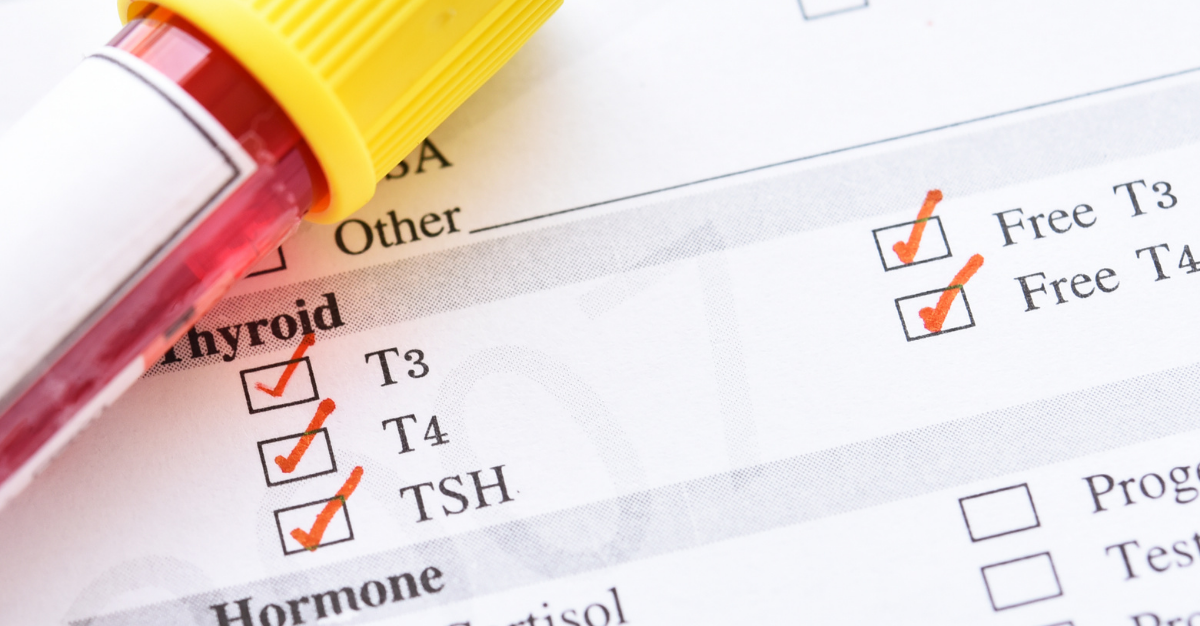
Your thyroid is a small organ with a huge impact on all aspects of your health. Thyroid hormone impacts every cell in your body, so even a small disturbance in thyroid hormone levels affects your digestive tract, brain, heart, metabolism, glucose and cholesterol levels, and much more.
Yet, despite its importance, thyroid problems are one of the most under-diagnosed conditions in the world. As many as 60% of people with thyroid problems aren’t aware. By some estimates, up to one in 10 North Americans have a thyroid problem, and that number rises to one in eight for women. That’s a lot of people experiencing unnecessary health issues!
For many people, thyroid issues are the result of low levels of thyroid hormone, a condition referred to as hypothyroidism. Some of the symptoms of hypothyroidism include:
- Weight gain
- Fuzzy thinking
- Depression
- Constipation
- Chronic fatigue
- Always feeling cold
- Infertility
- Dry skin
To further complicate matters, many thyroid treatments fall spectacularly short when it comes to improving a patient’s quality of life. At the root of the problem lie inadequate diagnostic tools. Traditionally, conventional medical practitioners run two tests for thyroid hormone levels: one for thyroid-stimulating hormone (TSH) levels and one for the hormone thyroxine (T4). Then they place patients on thyroid hormones or iodine in hopes of restoring balance. In effect, this is a Band-Aid solution that doesn’t get to the root of the problem.
By prescribing thyroid hormone without a full investigation, medical practitioners may run the risk of harming their patients’ health. Growing evidence suggests thyroid hormone is over-prescribed, and may even increase a patient’s risk of mortality.
When blood tests show a dip in thyroid hormone levels, thyroid hormone replacement therapy drugs such as levothyroxine, are very commonly prescribed.
Those that have clear low thyroid levels (hypothyroidism) benefit from this medical treatment, however, the problem may lie in those who may have only a few, mild symptoms of hypothyroidism and come back with borderline test results, known as subclinical hypothyroidism, and older adults in particular.
Studies show those aged 65 and over who have been given thyroid replacement therapy have an increased risk of death. Due to the many hormonal changes that naturally begin to occur in older adults such as sleep changes and increased inflammation, natural dips in thyroid levels may occur. Thyroid replacement medication in these cases may not be necessary and if taken may be causing an override of said changes, therefore causing further complications.
Why traditional approaches fall short.
Focusing solely on levels of TSH and T4, and then applying a quick fix, ignores the fact that the most common cause of hypothyroidism is actually an autoimmune disease called Hashimoto’s. When someone experiences Hashimoto’s, their white blood cells and antibodies erroneously attack the thyroid, leading to a reduction in thyroid hormone secretion.
We haven’t yet determined the cause of autoimmune diseases, although evidence suggests genetic factors, inflammation, certain medications, and stress can all contribute. As well, studies have found possible connections between “leaky gut” syndrome, or increased permeability, and the autoimmune system.
Because of the vague causes for autoimmune disorders, traditional medicine tends to treat just the symptoms, without taking a holistic approach to address overall health. This is particularly true for Hashimoto’s, which is problematic. Without proper treatment, the immune system will continue to attack the thyroid gland, making it increasingly difficult to treat without addressing the autoimmune response.
The problem with traditional lab tests.
As you can see, thyroid problems and treatments are more complex than simply trying to fix a shortage of hormones as determined from testing TSH and T4. For better results, and a more holistic treatment plan, patients need more comprehensive assessments. Below are five causes of thyroid problems that won’t be detected by standard tests.
Pituitary problems.
The production of thyroid hormone is controlled by a gland at the base of the brain called the pituitary gland, which releases TSH. Elevated cortisol levels can damage the pituitary gland, which in turn reduces the amount of TSH, and consequently the amount of thyroid hormone.
Inefficient conversion of T4 to T3.
In order to be used by your body, T4 must be converted to another hormone, triiodothyronine, more commonly called T3. If this process doesn’t run smoothly, your body won’t have its optimum amount of T3, even if your T4 test results look good. An excess of the stress hormone cortisol in your body can impact this process.
High TBG levels.
Thyroid hormone travels through the bloodstream thanks to a protein called thyroid-binding globulin (TBG). High TBG levels can lower the amount of active thyroid hormone since it is inactive when bound to TBG. Excess estrogen can result in elevated TBG levels, which can lead to hypothyroidism, even if the results of the traditional tests are within the normal range.
Low TBG levels.
Paradoxically, low TBG levels can also lead to hypothyroidism. That’s because low levels result in an excess of free thyroid hormone in the blood, which causes cells to develop resistance. The result is hypothyroidism since although there is enough thyroid hormone in the blood, the body’s cells aren’t receptive to it. Common causes of low TBG levels include high testosterone levels and insulin resistance.
Thyroid resistance.
The receptors in your cells can be damaged by high levels of T4 or T3, or high levels of cortisol. As well, chronic stress can lead to adrenal fatigue, which is also harmful.
Optimum thyroid performance depends on a tightly woven interplay of processes, and, as shown above, just one imbalance can throw the whole thing off.
Traditional tests aren’t always going to recognize the various factors that contribute to thyroid problems. If you want to take a deeper dive into your thyroid health, give us a call!
Sources
Stoll K. Disparities in Thyroid Screening and Medication Use in Quebec, Canada. Health Equity. 2019;3(1):328-335. Published 2019 Jul 11. doi:10.1089/heq.2018.0051
Mu Q, Kirby J, Reilly CM, Luo XM. Leaky Gut As a Danger Signal for Autoimmune Diseases. Front Immunol. 2017;8:598. Published 2017 May 23. doi:10.3389/fimmu.2017.00598
Stratakis CA, Chrousos GP. Neuroendocrinology and pathophysiology of the stress system. Ann N Y Acad Sci. 1995 Dec 29;771:1-18. doi: 10.1111/j.1749-6632.1995.tb44666.x. PMID: 8597390.
Bernadette Biondi, David S. Cooper, The Clinical Significance of Subclinical Thyroid Dysfunction, Endocrine Reviews, Volume 29, Issue 1, 1 February 2008, Pages 76–131, https://doi.org/10.1210/er.2006-0043
Enoch Joseph Abbey, MD, MPH, Eleanor M Simonsick, PhD, John McGready, PhD, Jennifer Sophie Mammen, MD,PHD, OR18-05 Thyroid Hormone Use and Survival among Older Adults – Longitudinal Analysis of the Baltimore Longitudinal Study of Aging (BLSA), Journal of the Endocrine Society, Volume 4, Issue Supplement_1, April-May 2020, OR18–05, https://doi.org/10.1210/jendso/bvaa046.235



